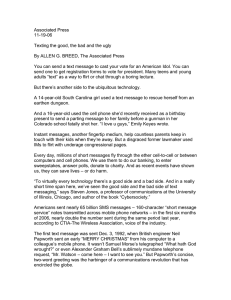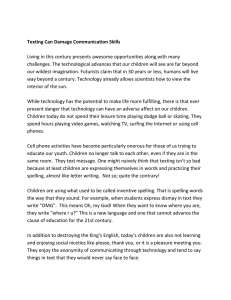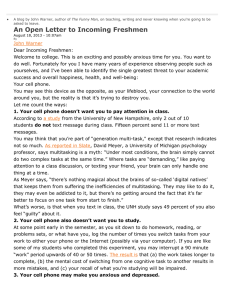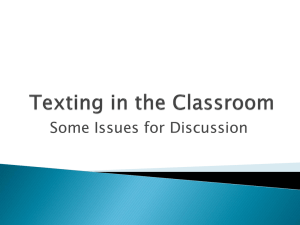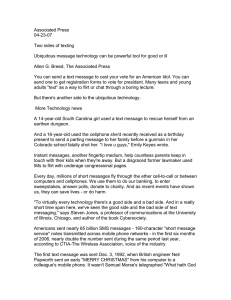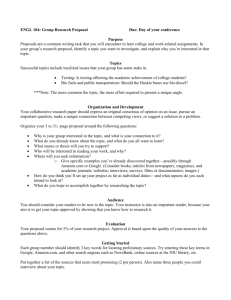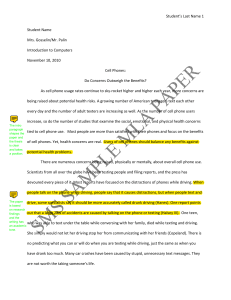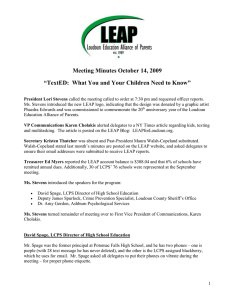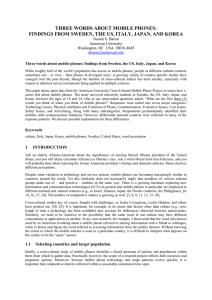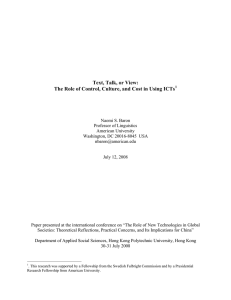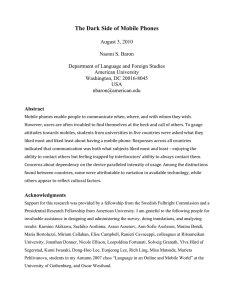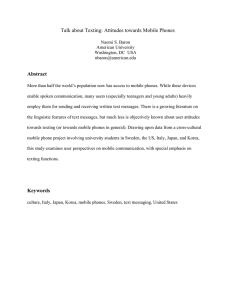Associated Press 10-16-06 Texting a Powerful Tool for Good or Ill
advertisement
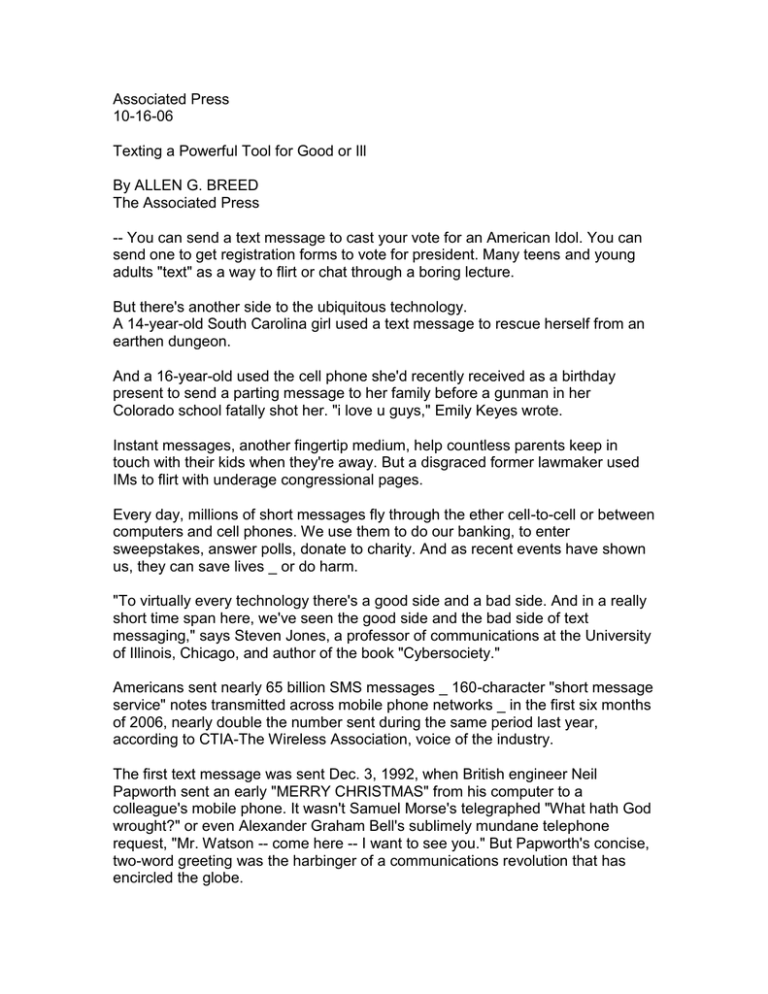
Associated Press 10-16-06 Texting a Powerful Tool for Good or Ill By ALLEN G. BREED The Associated Press -- You can send a text message to cast your vote for an American Idol. You can send one to get registration forms to vote for president. Many teens and young adults "text" as a way to flirt or chat through a boring lecture. But there's another side to the ubiquitous technology. A 14-year-old South Carolina girl used a text message to rescue herself from an earthen dungeon. And a 16-year-old used the cell phone she'd recently received as a birthday present to send a parting message to her family before a gunman in her Colorado school fatally shot her. "i love u guys," Emily Keyes wrote. Instant messages, another fingertip medium, help countless parents keep in touch with their kids when they're away. But a disgraced former lawmaker used IMs to flirt with underage congressional pages. Every day, millions of short messages fly through the ether cell-to-cell or between computers and cell phones. We use them to do our banking, to enter sweepstakes, answer polls, donate to charity. And as recent events have shown us, they can save lives _ or do harm. "To virtually every technology there's a good side and a bad side. And in a really short time span here, we've seen the good side and the bad side of text messaging," says Steven Jones, a professor of communications at the University of Illinois, Chicago, and author of the book "Cybersociety." Americans sent nearly 65 billion SMS messages _ 160-character "short message service" notes transmitted across mobile phone networks _ in the first six months of 2006, nearly double the number sent during the same period last year, according to CTIA-The Wireless Association, voice of the industry. The first text message was sent Dec. 3, 1992, when British engineer Neil Papworth sent an early "MERRY CHRISTMAS" from his computer to a colleague's mobile phone. It wasn't Samuel Morse's telegraphed "What hath God wrought?" or even Alexander Graham Bell's sublimely mundane telephone request, "Mr. Watson -- come here -- I want to see you." But Papworth's concise, two-word greeting was the harbinger of a communications revolution that has encircled the globe. The recent text message stories "give you an indication of the power of those devices and how, when used appropriately or inappropriately, they reveal character and true, genuine relationships," says Michael J. Bugeja, director of the Greenlee School of Journalism and Communication at Iowa State University. "It's a power we have not earned and don't yet know how to use." Text started as a message service, a way for companies to efficiently inform customers about things such as problems with the network. But with the proliferation of cell phones and PDAs, texting and IMing have evolved into an indispensable _ some would say annoyingly inescapable _ form of social interaction. After talking, texting is the most important function people are looking for in their cell phones, says Miro Kazakoff, head of the handset research practice at Boston-based Compete, Inc. "More important than the camera. More important than Bluetooth." A recent survey found that 80 percent of Americans aged 18 to 29 own cell phones, and 65 percent of those text message on a regular basis. The practice has become so ubiquitous that the NCAA, which has restricted phone communications with sports recruits in the past, recently announced it is considering imposing text-message limits, too. Abbreviated messages are nothing new. "TTFN," said Tigger in the Winnie-thePooh stories, meaning "Ta-ta-for now." And many a lover has licked an envelope and scribbled SWAK _ "Sealed With a But texters have turned cybershorthand into an art form _ g2g ("got to go"), lol ("laughing out loud"), btw ("by the way"), 2g2bt (too good to be true"), bobfoc ("body off Baywatch, face off Crimewatch"). With or without abbreviations, text messages can communicate almost anything from the banal to the beautiful, the puerile to the poetic. British soccer star David Beckham carried on an affair via texting and was undone when his pecked peccadilloes were revealed to the press. Indonesian entrepreneur Craig Abdurrohim Owensby sends subscribers a daily text message with a verse from the Quran. Critics have savaged the medium for its perceived depredations on grammar, punctuation and spelling. But texting has spawned its own literary forms. An SMS poetry contest in 2001 produced a winning entry with these lines: "txtin iz messin, mi headn'me englis, "try2rite essays, they all come out txtis..." And in wireless-crazed China, author Qian Fuchang became the first textmessage novelist in 2004 when he offered "Outside the Besieged Fortress," a steamy tale of extramarital love, in 60 chapters of 70 characters each. But events have illustrated a much more serious side to a medium we have come to take for gra Kiss." After terrorists flew two planes into New York's World Trade Center, United Airlines quickly sent a text message to its remaining airborne, transcontinental flights: "Beware any cockpit intrusion ..." In Lower Manhattan that day, meanwhile, workers used their Blackberries to check on each other and give directions where to flee. QUIZ How much data does Yahoo plan to seal in its digital time capsule? A. 200 gigabytes B. 6,000 gigabytes C. 5 terabytes D. 1 petabyte • Test Your Knowledge -- More Questions washingtonpost.com Video Mash-Up Readers have the opportunity to create their own interview clips opposite Post political reporter Dana Milbank. We provide the questions, you provide the answers! * Create Your Own Mash-Up Partnership Resources for anyone who runs a small business or wants to start one. • Starting a Business • Small Business on the Net • Home-Based Businesses » FULL COVERAGE Save & Share Article Digg Google What's This? del.icio.us Yahoo! Reddit The same stealthiness that allows kids to cheat on exams enabled the girl in South Carolina to quietly message her mother precise directions on where to send help. "im in a hole," she wrote to her mother on her captor's cell phone. "theres a bomb call police." Joe Farren, a CTIA spokesman, says, "Emergencies now can be reported as they happen. There's no longer a lag time. And that has proven to save lives. And obviously the South Carolina incident is evidence of that." In Ohio recently, a 15-year-old boy was arrested after a girl showed her father this message she'd gotten from him: "I'm bringing a gun to school and (name deleted) is at the top of the list." Text messages leave a kind of electronic "paper trail" when the technology is abused. Former Rep. Mark Foley, R-Fla., has acknowledged using instant messages, a similar technology, to interact with House interns. "how my favorite young stud doing," he wrote in one exchange. Those words, typed under the now-infamous cyberhandle maf54, could be used against him. Electronic communication, some complain, can create the illusion of distance and anonymity and lull us into a false sense of security. Cell phone technology has infiltrated our lives so much that we're "interpersonally stupid," says Bugeja, author of the book "Interpersonal Divide: The Search for Community in a Technological Age." "We bought cell phones so that we can be safe, and then we use those cell phones to order pizza driving in a rainstorm," he says. "We're chatting with people we believe are friends who may turn out to be predators." In a recent survey, 65 percent of parents who text message said they communicate more frequently with their children when they're away from home. Kazakoff says texting is merely an unobtrusive way to stay in touch, whether it's communicating from the other side of the world or just across the room at a noisy party. "It's appropriate for certain situations," he says. "It doesn't replace face to face." Jones concedes that technology made it easier for Foley to insinuate himself into the lives of his young charges. But it was not responsible for the conditions underlying those messages. "In both the Foley case and the case of these (kidnapped) kids, there were no technological problems here," he says. "These were social problems."
